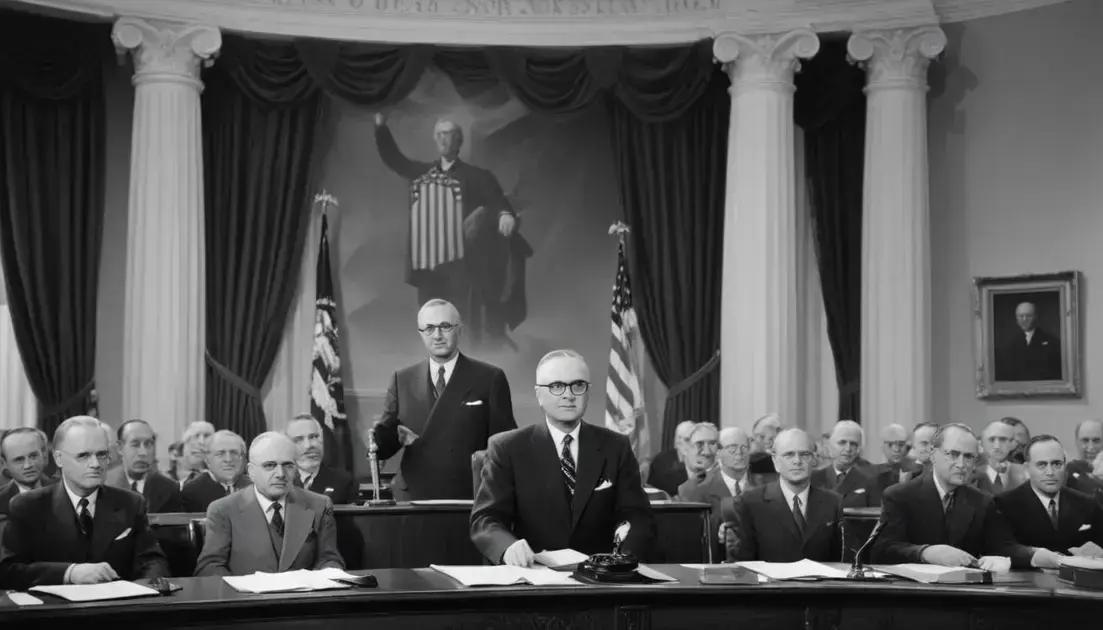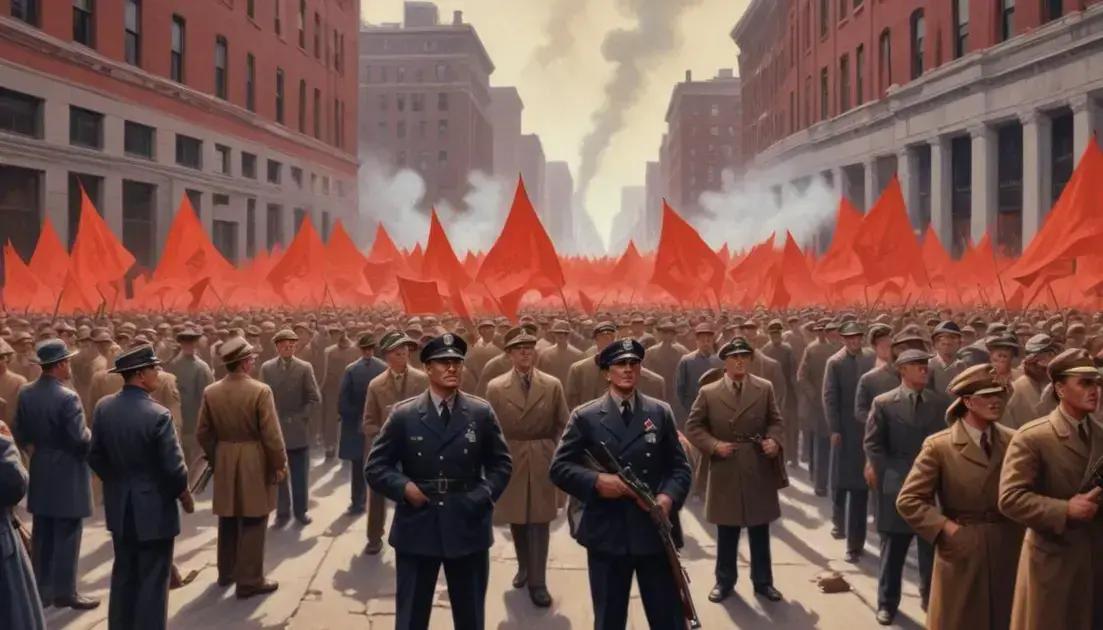
Truman Doctrine: The Beginning of Containment Policy Against Communism
The Truman Doctrine was a pivotal U.S. foreign policy established in 1947 aimed at containing communism globally. By providing military and economic aid to countries like Greece and Turkey, the doctrine marked a shift from isolationism to active global engagement. Its legacy continues to influence American actions and discussions about democracy and interventionism today, reflecting ongoing debates about U.S. involvement in international conflicts.
Containment Policy shaped the course of the Cold War, as the Truman Doctrine emerged to curb the spread of communism. Ever wondered how this policy influenced international relations?
Historical Context of the Truman Doctrine
The Truman Doctrine was announced in 1947 at a time when the world faced new challenges. After World War II, many countries were vulnerable and struggling.
With the rise of communism, the United States wanted to stop it from spreading. This was especially true for countries like Greece and Turkey, where the fear of communism was strong.
President Harry S. Truman believed that if these nations fell to communism, others would follow. This idea is known as the domino theory.
So, the Truman Doctrine stated that the U.S. would support free peoples resisting subjugation by armed minorities or outside pressures. It marked a shift in U.S. foreign policy from isolationism to a more active role globally.
This approach aimed not just to contain communism but also to promote democracy and freedom. The U.S. would provide military and economic aid to countries resisting Soviet influence.
In summary, the historical context of the Truman Doctrine highlights how the U.S. responded to global changes and set the stage for the Cold War.
Effects of Containment Policy on Global Politics
The Containment Policy greatly shaped global politics during the Cold War. It aimed to prevent the spread of communism beyond where it already existed.
This policy affected many countries, especially in Europe and Asia. The U.S. led efforts to support nations resisting Soviet influence, like in Greece and Turkey.
By offering military aid and economic support, the U.S. helped these countries maintain their independence. This created alliances that would last for decades.
One major effect was the division of Europe into two blocks: the Eastern bloc and the Western bloc. The East was under Soviet control, while the West aligned with the U.S.
Another significant outcome was the Korean War in the early 1950s. The U.S. intervened to stop North Korea from spreading communism to South Korea.
The ripple effects of the Containment Policy influenced other conflicts too. It led to U.S. involvement in places like Vietnam and Cuba.
In summary, the Containment Policy not only shaped U.S. strategies but also altered the political landscape around the globe.
Key Events Leading to the Truman Doctrine
Several key events led to the creation of the Truman Doctrine in 1947. Understanding these events helps to grasp why the U.S. took such an active role in global politics.
After World War II, many European countries were in ruins. They faced economic hardship and political instability. This situation made them vulnerable to communism.
The British government was helping Greece and Turkey fight against communist pressures but could no longer afford it. This left a gap that the Soviets could exploit.
In response, President Harry S. Truman decided to step in. In early 1947, he announced the need for a new policy to support free nations resisting subjugation.
Another important event was the civil war in Greece. It pitted the Greek government against communist rebels. The U.S. believed that if Greece fell to communism, it would lead to more countries following suit.
Additionally, the situation in Turkey was tense. Communist influence was growing there too. The U.S. wanted to prevent this from happening and therefore offered help to Turkey as well.
These events helped shape the Truman Doctrine, committing the U.S. to a policy of containment against communism.
Criticism and Support for the Policy
The Truman Doctrine faced both criticism and support. Many believed it was necessary to fight communism. Others disagreed, thinking it could lead to more conflict.
Supporters argued that the policy was vital to protect democracy. They felt that aiding countries like Greece and Turkey would stop the spread of communist influence.
Many thought this was a moral duty. America had a responsibility to help free peoples. This view resonated strongly with many Americans after World War II.
However, critics warned that the policy could cause unnecessary wars. They believed it might trap the U.S. in conflicts that had nothing to do with its interests.
Some questioned the wisdom of intervening in other countries’ affairs. They felt that it could lead to resentment and backlash against the U.S.
Additionally, there were concerns about the costs. Supporting foreign nations would require significant resources. Critics argued that these funds could be better spent at home.
Despite the concerns, the Truman Doctrine set the tone for U.S. foreign policy for years. It began a long-standing commitment to contain communism around the world.
Legacy of the Truman Doctrine Today
The legacy of the Truman Doctrine is still felt today. It shaped U.S. foreign policy for decades. The commitment to contain communism continued long after Truman left office.
Many of the conflicts that followed, like the Vietnam War, were influenced by this doctrine. It established a pattern of American involvement in global affairs to counter perceived threats.
After the Cold War ended, the principles of the Truman Doctrine evolved. The U.S. began to focus on spreading democracy and human rights worldwide.
Today, the spirit of the Truman Doctrine can be seen in how the U.S. responds to authoritarian regimes. There’s a push to support pro-democracy movements, much like in the past.
Moreover, the doctrine sparked debates about interventionism. The discussions around these topics are still relevant. Critics often refer back to the Truman Doctrine when arguing against foreign interventions.
Overall, the Truman Doctrine laid the groundwork for U.S. actions in international relations. It continues to influence America’s approach to global politics even today.
Conclusion
In conclusion, the Truman Doctrine played a crucial role in shaping U.S. foreign policy during the Cold War. Its commitment to containment influenced many aspects of international relations for years to come. Today, we can see its legacy in how the U.S. approaches global democracy and freedom.
While the doctrine faced both support and criticism, it laid the groundwork for America’s ongoing involvement in world affairs. The debates it sparked about interventionism are still relevant now.
Overall, understanding the Truman Doctrine helps us grasp current U.S. policies. Its impact continues to resonate, reminding us of the importance of engaging with the global community in the fight for democracy.


